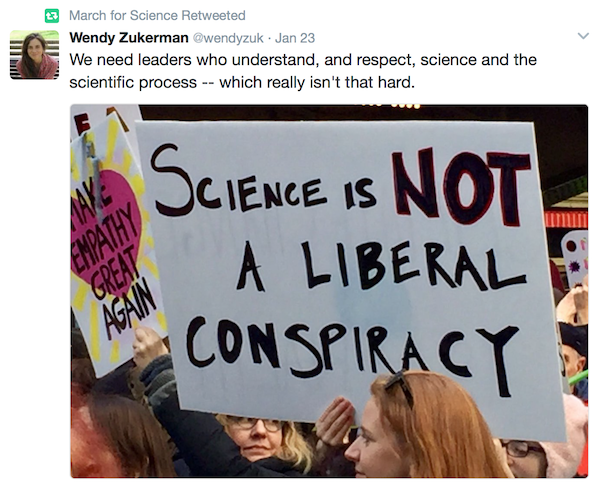A potentially heartwarming development has occurred in recent days. A grassroots movement supporting a "Science March" has amassed a gigantic following on social media, which in turn has resulted in substantial mainstream media coverage. The website, which is still in development, says that "anyone who values empirical science" can participate. Good.
Unfortunately, some of the other statements have sent mixed messages. Consider this:

I agree 100% with every sentence. So, what's the problem?
The problem is that this message is aimed at one particular side of the political spectrum. The Right is more likely to reject climate change and evolution than the Left. Absent from this paragraph are warnings against the rejection of nuclear power, GMOs, and vaccines, and admonishments for the embrace of organic food and alternative medicine, which are stronger with the progressive Left and its leadership. Those issues aren't even mentioned, which looks like they don't want to alienate one side.
The movement's Twitter feed has also raised concerns. First, it retweeted this:

Again, I agree 100%. But similar to my objection above, this criticism is aimed directly at one side of the political spectrum. Those organizations aligned against GMOs and energy claim that science is a corporate conspiracy. No signs about that. Then, the account tweeted this:

In case this concept is unfamiliar, "intersectionality" is a common theme taught in women's studies and other similar classes. The idea revolves around understanding that people have multiple identities (e.g., gender, sexuality, ethnicity, etc.), but it often devolves into dubious discussions on oppression and the adoption of a victimhood mentality, as "recovering feminist" Toni Ariaksinen eloquently explains.
Regardless of where one stands on this issue, the question remains, "What does this have to do with science?" Nothing. It's social signaling meant to excite one side of the political spectrum.
These not-so-subtle hints have been picked up by the media. Los Angeles Magazine published the following headline:

Yet again, I am fully in support of a pro-fact agenda, we have been battling alternative facts - promoted by environmental groups and scaremongers - since 1978. I've spent my entire life in science and journalism, and I have spent a substantial proportion of it debunking pseudoscientific nonsense. Though they are few in number, there are scientists who support Donald Trump. But this headline makes it clear they aren't welcome at the march.
Raising awareness of the importance of science and the (usually) nonpartisan nature of the scientific enterprise is a worthy mission. However, if this march is not bipartisan and is instead dominated by one side of the political spectrum, it will have failed miserably in the very goal it seeks to achieve.




